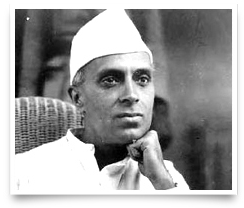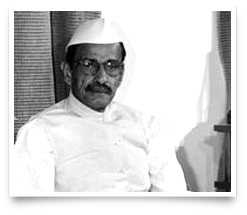Founder
Pandit Jawaharlal Nehru
Pandit Jawaharlal Nehru, the first Prime Minister of independent India was born at Allahabad on 14 November 1889. He was the only son of Motilal Nehru and Swarup Rani. From the age of 15 to 23 Jawaharlal studied in England at Harrow, Cambridge and the Inner Temple returning to India in 1912.
Jawaharlal Nehru remained the Prime Minister of India for 17 long years and can rightly be called the architect of modern India. He set India on the path of democracy and nurtured its institution - Parliament, multi-party system, independent judiciary and free press. He encouraged Panjayati Raj institutions.
With the foresight of a statesman he created institutions like Planning Commission, National Science Laboratories and laid the foundation of a vast public sector for developing infrastructure for industrial growth. Besides,developing the public sector, Nehru also wanted to encourage the private sector to establish a social order based on social justice he emphasised the need of planned development. Nehru gave a clear direction to India’s role in the  comity of nations with the policy of non alignment and the principle of Panchsheel, the five principles of peaceful coexistence at a time when the rivalries of cold-war were driving the humanity to its doom. His vision was that of extensive application of science and technology and industrialisation for better living and liberation from the clutches of poverty, superstition and ignorance. Education to him was very important for internal freedom and fearlessness. It was Nehru who insisted if the world was to exist at all; it must exist as one. He was generous and gracious. Emotional sensitivity and intellectual passion infused his writings, giving them unusual appeal and topicality even today. He was awarded Bharat Ratna in 1955. He never forgot India's great cultural heritage and liked to combine tradition with modernity.
comity of nations with the policy of non alignment and the principle of Panchsheel, the five principles of peaceful coexistence at a time when the rivalries of cold-war were driving the humanity to its doom. His vision was that of extensive application of science and technology and industrialisation for better living and liberation from the clutches of poverty, superstition and ignorance. Education to him was very important for internal freedom and fearlessness. It was Nehru who insisted if the world was to exist at all; it must exist as one. He was generous and gracious. Emotional sensitivity and intellectual passion infused his writings, giving them unusual appeal and topicality even today. He was awarded Bharat Ratna in 1955. He never forgot India's great cultural heritage and liked to combine tradition with modernity.
Jawaharlal was a prolific writer in English and wrote a number of books like ‘The Discovery of India’, ‘Glimpses of World History’, his autobiography, ‘towards Freedom' (1936) ran nine editions in the first year alone. Emotional sensitivity and intellectual passion infused his writings, giving them unusual appeal & topicality even today. He was awarded Bharat Ratna in 1955.
Pandit Nehru loved children and they call him affectionately as Chacha Nehru. His birthday is observed as Children's Day. He believed that children are the future of the nation. Nehru passed away in 1964.
Gulzari Lal Nanda
Born on July 4, 1898, in Sialkot (Punjab), Shri Gulzarilal Nanda was educated at Lahore, Agra and Allahabad. He worked as a research scholar on labour problems at the University of Allahabad (1920-1921) and became Professor of Economics at the National College (Bombay) in 1921. He joined the Non-Cooperation Movement the same year. In 1922, he become Secretary of the Ahmedabad Textile Labour Association in which he worked until 1946. He was imprisoned for Satyagraha in 1932, and again from 1942 to 44.
Shri Nanda was elected to the Bombay Legislative Assembly in 1937 and was Parliamentary Secretary (Labour and Excise) to the Government of Bombay from 1937 to 1939. Later, as Labour Minister of the Bombay Government (1946-50), he successfully piloted the Labou r Disputes Bill in the State Assembly. He served as Trustee, Kasturba Memorial Trust; Secretary, Hindustan Mazdoor Sevak Sangh; and Chairman, Bombay Housing Board. He was also a Member of the National Planning Committee. He was largely instrumental in organising the Indian National Trade Union Congress and later became its President.
r Disputes Bill in the State Assembly. He served as Trustee, Kasturba Memorial Trust; Secretary, Hindustan Mazdoor Sevak Sangh; and Chairman, Bombay Housing Board. He was also a Member of the National Planning Committee. He was largely instrumental in organising the Indian National Trade Union Congress and later became its President.
In 1947, he went to Geneva as a Government delegate to the International Labour Conference. He worked on the 'The Freedom of Association Committee' appointed by the Conference and visited Sweden, France, Switzerland, Belgium and England to study labour and housing conditions in those countries.
In March 1950, he joined the Planning Commission as its Vice-Chairman. In September the following year, he was appointed Planning Minister in the Union Government. In addition, he was also given charge of the portfolios of Irrigation and Power. He was elected to the House of the People from Bombay in the general elections of 1952 and was re-appointed Minister for Planning Irrigation and Power. He led the Indian Delegation to the Plan Consultative Committee held at Singapore in 1955, and the International Labour Conference held at Geneva in 1959.
Shri Nanda was elected to the Lok Sabha in the 1957 general elections, and was appointed Union Minister for Labour and Employment and Planning and, later, as Deputy Chairman of the Planning Commission. He visited the Federal Republic of Germany Yugoslavia and Austria in 1959. He was re-elected to the Lok Sabha in the 1962 general elections from Sabarkantha Constituency in Gujarat. He initiated the Congress Forum for Socialist Action in 1962. He was Union Minister for Labour and Employment in 1962 and 1963 and Minister for Home Affairs from 1963 to 1966.
Following the death of Pt. Nehru, he was a sworn in as Prime Minister of India on May 27, 1964. Again on January 11, 1966, he was sworn in as Prime Minister following the death of Shri Lal Bahadur Shastri at Tashkent.